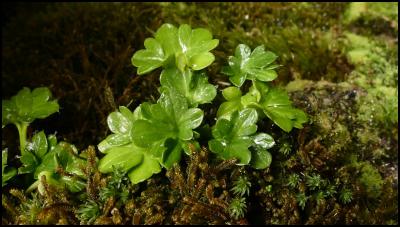Rare native buttercup found on Stewart Island
Media release
12 April 2017
Rare native buttercup found on Stewart Island

Mount Allen buttercup
Ranunculus
Department of Conservation botanists have found a rare native buttercup on a remote mountain range on Stewart Island/Rakiura.
The DOC team discovered the Mount Allen buttercup (Ranunculus viridis) growing on a mountainside in the Tin Range during a dedicated survey last month.
DOC Technical Advisor and botanist, Brian Rance, says the survey team found about 138 rosettes on an estimated 50 buttercup plants growing at six sites within the inhospitable and often cloud-covered, rocky landscape of Mount Allen.
“We’re really pleased to have located this buttercup and to find that there don’t appear to be any immediate threats to its survival.”
“Mount Allen buttercup is naturally rare because it lives in a specialised sub-alpine habitat and is one of a number of endemic plants found only on Stewart Island.”
The survey also enabled two rosettes to be collected, which are being grown in a climate-controlled glasshouse at the Dunedin Botanic Garden, says Brian Rance.
“The Dunedin Botanic Garden is helping to conserve the Mount Allen buttercup by propagating and studying this obscure plant and hopefully being able to grow an insurance population.”
Ranunculus viridis was first discovered in the early 1980s by botanist Hugh Wilson and was also seen by a party of botanists in the early 2000s.
The plant has the highest threat classification of ‘nationally critical’ and was on a priority list of little known species for DOC to assess its population size, threats and management needs.
New Zealand has 45 named species of buttercup (Ranunculus), of which three are found only on Stewart Island/Rakiura. Our most well-known buttercup is the large and showy Mount Cook buttercup.
Stewart Island/Rakiura is a hotspot for endemic plants with at least 28 native plants, many of them alpine species, found there. With its extensive intact natural areas, the island is an important place for plant conservation nationally.
–Ends–


 NZ Telecommunications Forum - TCF: New Zealand Is Saying Goodbye To 3G: Are You Ready For The Change?
NZ Telecommunications Forum - TCF: New Zealand Is Saying Goodbye To 3G: Are You Ready For The Change? NZ Post: Mānawatia A Matariki - NZ Post Stamps Look To The Stars Ahead Of The Māori New Year
NZ Post: Mānawatia A Matariki - NZ Post Stamps Look To The Stars Ahead Of The Māori New Year Waipa Networks: Cambridge Is Open For Business With $45M Energy Boost
Waipa Networks: Cambridge Is Open For Business With $45M Energy Boost Master Plumbers Gasfitters and Drainlayers NZ: New Consumer NZ Test Reveals Danger Of Unregulated Online Plumbing Products
Master Plumbers Gasfitters and Drainlayers NZ: New Consumer NZ Test Reveals Danger Of Unregulated Online Plumbing Products Mindful Money: Winners At The Mindful Money Annual Ethical & Impact Investment Awards 2025
Mindful Money: Winners At The Mindful Money Annual Ethical & Impact Investment Awards 2025 MBIE: Gas Supply Reducing Faster And Sooner Than Previously Forecast
MBIE: Gas Supply Reducing Faster And Sooner Than Previously Forecast


